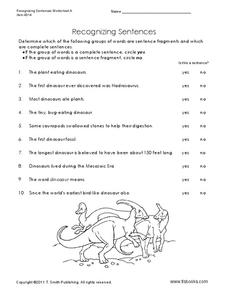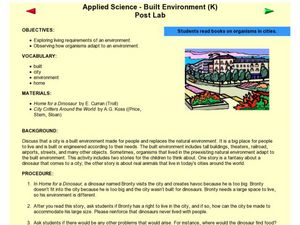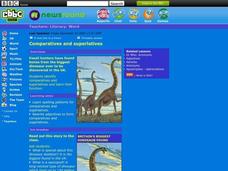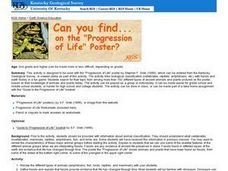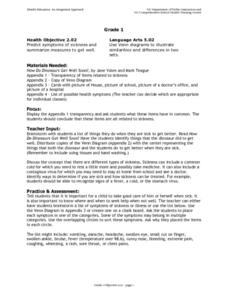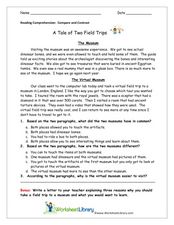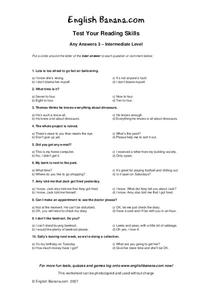Curated OER
Quotation Marks
Seeing multiple quotation mark mishaps in your class? Show them how to use quotation marks properly with this handout. While this is not an interactive worksheet, it could act as a reference sheet for writers as they compose and edit...
Curated OER
Be a Paleontologist
Students search for fossils in a simulated archeology site and explore how paleontologists mark out a dig site.
Curated OER
Desert Postcards
Students research characteristics of deserts. They present their findings in small groups to the class. Students utilize information learned about desert biomes, geography of the route of the Niger, and expeditions in their writing.
Curated OER
Subtracting Zero
In this subtraction worksheet, students will subtract zero from one, two and three digit numbers. The equations are presented vertically.
Curated OER
Recognizing Sentences
In this complete sentences worksheet, students complete 10 yes or no questions about sentences. Students must decide if each line is an example of a complete sentence or not.
Curated OER
The Moon Book
For this moon worksheet, students read the book The Moon Book and list facts about the moon and draw eclipses. Students list 10 facts and draw 3 kinds of eclipses.
Curated OER
Dino Number Practice 1-5
In this number worksheet, students practice writing numbers 1-5. In addition, students follow directions and practice recognizing shapes and colors.
Curated OER
Measure for Measure: Time & Temperature
Young scholars examine scientific inquiry. In this time and temperature lesson students create a template to solve scientific problems and work through a science problem.
Curated OER
Organisms In Cities
Students explore environments and how organisms adapt to the environment. In this science lesson, students read a story and discuss how animals have adapted to changes in their environment.
Curated OER
Mighty Metaphors
Fourth graders explore metaphors and then complete a worksheet on which they write metaphors. They may illustrate the metaphors.
Curated OER
Scheduled Events: indicating planned activities and events
In this activities and events learning exercise, students choose the correct words to complete the sentences about planned activities and events. Students complete 12 sentences total.
Curated OER
Living Fossils
Students study the term living fossil and examine why some of the reasons they survived. In this fossils lesson students form a hypothesis and use data to see if it is accurate.
Curated OER
Jurassic Park Debate
Students research behavior, phsyiology, and ecology of dinoaurs. Students role-play as scientific specialists such as geneticists and ecologists. They present their research findings in a research paper.
Curated OER
Comparatives and superlatives
Students identify comparatives and superlatives. Students read article on comparatives and superlatives. They explore spelling patterns. Students rewite adjectives to form comparatives and superlatives and complete a worksheet.
Curated OER
Classification of Animals
Students explore animal characteristics by participating in a SMART board activity. In this animal classification lesson, students utilize a sorting chart to divide different animal names by their observable characteristics. Students...
Curated OER
Can You Find...on the "Progression of Life" Poster?
Students examine and analyze a poster that presents various types of animals throughout the ages. They determine biological classification with fossils and earth history in a game.
Curated OER
Animal Tracks - Walking and Running
Students, using paper and water, make tracks and record the time needed to make them. They compare tracks made walking and running to determine the speed of the animal.
Curated OER
Problem Solving: Use a Graph 3
For this math problem solving worksheet, students examine a graph based on books read and use it to solve 2 problem solving questions and a test prep question.
Curated OER
When You're Sick
Second graders identify symptoms of illness and how they can get better. In this health instructional activity, 2nd graders use Venn diagrams to categorize what the character of a story did to get well, and different types of symptoms.
Curated OER
Reduce, Reuse, Recycle
Learners develop a recycling plan. For this environmental lesson, students develop a recycling plan for their school. Learners write an outline of the plan to present to their class.
Curated OER
A Tale of Two Field Trips
For this museum worksheet, students read about visiting a museum and a virtual museum and answer multiple choice questions about them. Students complete 3 questions.
Curated OER
Understanding Cause and Effect using A Sound of Thunder
Students listen to a short story, A Sound of Thunder, and retell parts of the story which is about time travel. They respond to the story by writing cause/effect outcomes about the ecosystem using a handout.
Curated OER
Test Your Reading Skills-- Any Answers 3
In this language arts learning exercise, 4th graders read a question or comment that might be made in conversation. From a list of 4 responses, students choose the one that best answers the question or responds appropriately to the comment.
Curated OER
The Ancient Cycads
In this cycads worksheet, students will read a short essay on the cycad tree, including it's reproductive strategies and it's general characteristics. Then students will complete 2 short answer questions based on what they read.
Other popular searches
- Preschool Dinosaurs
- Free Preschool Dinosaurs
- Dinosaurs Before Dark
- Dinosaurs Math Activities
- Dinosaurs Math
- Research Tools Dinosaurs
- Dinosaurs Lesson Plans
- Dinosaurs Extinct
- Dinosaurs and Extinction
- Math With Dinosaurs
- Dinosaurs Plays
- Dinosaurs Lesson Plans Math






